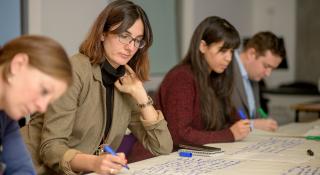
Breadcrumbs navigation
Decolonising the UK curriculum should be the start of a much wider process
Dr Robert Mason discusses the progress towards, and challenges of, decolonisation processes in UK universities.
In recent years there have been efforts by UK universities to ‘decolonise’ their imperial pasts and curricula. From the ‘Rhodes Must Fall’ campaign which started in South Africa in 2015 and extended to the University of Oxford, to the death of George Floyd in May 2020 and the subsequent Black Lives Matter movement, British universities have been engaged in soul searching on a number of issues including racism, slavery, trafficking, and Islamophobia. Work on decolonisation at UK universities had been focused within specific academic departments that have traditionally taught and supervised on questions related to hegemonic power and socioeconomic conditions. For example, the University of Liverpool teaches one of the few Masters degrees on International Slavery Studies. As of 2020, moves to ‘decolonise’ the curriculum were only being implemented in 20 percent of UK universities. Although there are more interdisciplinary groups and events dedicated to ‘decolonising’ curricula in 2022, they have been rather piecemeal.
Brexit, the cost-of-living crisis, and the death of Queen Elizabeth II will inevitably draw renewed attention to British colonial history, interactions, and influence in the wider world. These events will exacerbate tensions in British identity between imperial nostalgia and ‘Global Britain’ versus the reality of Britain as a medium power in a changing international system. In the realm of Politics and International Studies, especially Middle Eastern Studies, the process of ‘decolonising’ the curriculum will only be a first step to achieving wider social equality and equity. As Robert Gildea notes in Empires of the Mind, British and French colonialism didn’t end with decolonisation, but continued through global financial imperialism in the 1980s and 1990s, and into the 2000s through the Global War on Terror (GWOT). The GWOT animated Edward Said’s concern about western representations of societies in the East (Asia, Middle East and North Africa) as exotic, inferior, stagnant, and degenerate. Bernard Lewis was the first to claim there was a “clash of civilizations” in 1957, a point popularised by Samuel P. Huntington’s 1993 Foreign Affairs article. Lewis, a professor at Princeton University for many years, provided the neoconservatives with the intellectual and moral justification to intervene in the Middle East and protect Israeli interests. President Chirac did not participate in the Iraq intervention but President Sarkozy did lead the NATO campaign in Libya and successive French governments maintain neo-colonial ambitions in Françafrique.
Racism continues to be a major structural concern. In July 2020 the Office for Students stated that the percentage of home students in England receiving a good (first or 2:1) undergraduate degree (full-time) was 18.3 percentage points lower for black students than for white students, 7.7 percentage points lower for Asian students, and 3.6 percentage points lower for the mixed minority student group. In 2021, the chair of the UK’s advisory group on stamping out racial harassment on campuses said there was evidence of systemic issues that disproportionately affect students from black and ethnic minority (BAME) backgrounds. Al Qaeda attacks throughout the 1980s and 1990s, which culminated in the 9/11 attacks, caused the UK government to retreat from multiculturalism to mono-cultural nationalism, with secularism in France and ‘British values’ operating, in part, as covers for Muslim exclusion. Islamophobia has been documented in various UK schools and universities, especially since 9/11, facilitated by anti-Islamic rhetoric and conflation between Islam and terrorism in sections of the media and from populist politicians. Islamic State, Boko Haram and a myriad of other violent Islamist actors complicate efforts to improve inter/intra-religious and cultural understanding, decisively tackle Islamophobia (for which there still lacks a working definition), and end conflict.
‘Decolonising’ the curriculum gets to the heart of what it is to be a scholar – overcoming intellectual limits in the search for truth, addressing structural disadvantages, unconscious bias (including through the lack of role models), isolation embedded in existing curricula and pedagogies, and helping students to critically engage with a diverse canon of knowledge rather than being passive recipients of it. The process has the power to transform our ideas, especially in disciplines such as literary studies, history, anthropology, sociology, area studies, and comparative religion. Decolonising the UK curriculum is an important marker along the road to achieving social justice in the UK. However, the real work of examining and addressing British neo-imperialist interests, building more effective interactions with the wider populations of the Global South, including helping to roll back the legacy of imperialism on other education systems, is yet to fully begin.
Author
Dr Robert Mason is editor of New Perspectives on Middle East Politics: Economy, Society and International Relations, and is co-convenor of the BISA Foreign Policy Working Group.
Photo by Davide Cantelli on Unsplash


